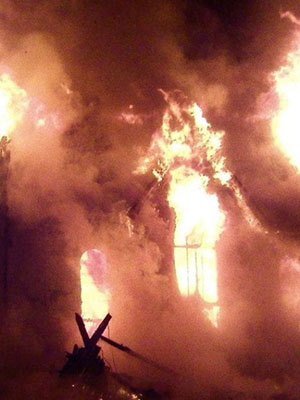On Hell
 Hell is traditionally considered a netherworld located in the depths of the earth. A fiery place of brimstone, it is where people are sent after death to be punished for the wickedness they perpetrated in life.
Hell is traditionally considered a netherworld located in the depths of the earth. A fiery place of brimstone, it is where people are sent after death to be punished for the wickedness they perpetrated in life.
The Hindus and Buddhists have their Naraka, the Christians their Inferno, the ancient Greeks had their Hades; these different underworlds each represented the “lower†nature of their respective cultures. Beings such as demons are said to reside in these places. But are these netherworlds simply mental containers for those aspects of the universe that we wish to distance ourselves from?
Often people say things like “I went through hell to get here” or “my day was hell today.” In a more serious setting, someone might say “I really had to wrestle with my demons,” in reference to their having experienced some tribulation. These symbolic uses seem hyperbolic, but the meaning remains.
Among the prominent ideas postulated by the psychoanalyst C.G. Jung is that when people externalize the more “hellish†aspects of life, these aspects are given more ground to manifest themselves. Our ignorance of such things formulates the bases of his “collective unconscious.”
The collective unconscious is a chaotic pool of psychic energy that resembles aspects of Luciferian consciousness in Christian theology. It can represent grand mysteries, which can lead ignorant people to question things that should not or cannot be questioned, like the existence of an objective reality.
In all cultures, the important demons are virtually inseparable from the universal aspects of humanity they represent. Each demon is ascribed a specific sin or quality, the purpose of which is not to instill fear of demons, but to illustrate that these concepts possess a certain anima which one needs to consciously acknowledge as an aspect of the self.
Epicurus may have been the first philosopher to argue that a hedonistic life was justified in that supernatural beings, supposing they existed, were of such magnificence that they couldn’t possibly have any interest in the affairs of lowly humans. Thus Epicureanism is wrongfully seen as being “atheistic†and justifying any form of perversion or hedonistic pursuit.Â
Jung’s postulation reminded the modern world of the dangers of Epicurean hedonistic mentalities in facing the reality of “demonic†influence without already having a firm grasp of it. To distance oneself from demons is to effectively embrace a false reality where only goodness exists, resulting in one’s false acceptance of the polar opposites of “goodness” as being themselves “good.”
Modern people, even religious ones, mentally distance themselves from the world of demons in an effort to justify a vainglorious, self-indulgent lifestyle. The subtle world of demonic influence seems to thrive in this environment, for it provides it with the camouflaged and stygian niches it requires to grow.Â
To fail to recognize these influences, and the notion that heaven and hell exist as polar reflections within the self, is to court disaster. This realization conflicts with our narcissistic attempt to realize heaven on earth and to externalize hell as being a distant or nonexistent “irrational” concept. To deny the devil is to play his game and not know it.
One of the great Russian writers of the 19th century, Fyodor Michaelovich Dostoevsky, wrote a “Christian existentialist” novel entitled “БеÑÑ‹â€. Translating this word into English is difficult; it is either “Demons,” “Devils” or “The Possessed,” but the nature of the Russian word leaves the ambiguity of whether demonic possession is a demon seizing an innocent Christian soul, or whether the individual who experiences the act of possession is in some way responsible.
In the Jungian view, demonic possession is not a simple matter of being controlled by wholly external forces but a case of inner demons getting the better of their host. External factors (temptations) lure the innocent toward the demon. For Dostoevsky, these demonic external factors would be the “new ideas†that had begun to circulate in 18th-19th century European society, with all of its nation-statist, egalitarian revolutions and rejection of traditional social values.
Russian society saw the onset of the first wave of “nihilistsâ€, young radicals with no direction or drive to participate in “normal†society. These are the “possessed†for whom the novel is named. At the end of the novel, it turns out that there is no “central basis†of the youth movement — it was all a fabrication of one of the characters to manipulate the others into following him.
Knowing these youths lacked direction, he tried to give them a sense of belonging in order to aggrandize his own ego and gain an army of followers. He regaled them with tales of revolution and freedom, but then they didn’t even have an understanding of what they were revolting against, from which they were to attain freedom.
From this study of demons we can learn much about our present situation. The problems of the world are not external; they dwell within. Another youth movement or revolution cannot cure them. Stability can only be attained when one has attained inner peace, which involves subjugating one’s inner demons.
Since this is a difficult enough undertaking in itself, it is not surprising that people devote themselves to this quest entirely or deny it completely. It also has another dark side. Much like the idealistic revolutionaries, those who wrestle with demonic forces may find themselves becoming one.
Tags: demonism, traditionalism









